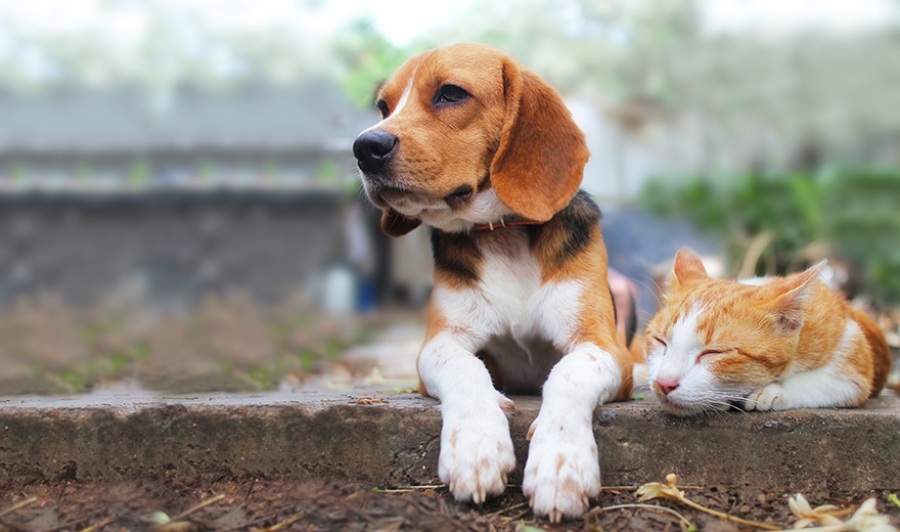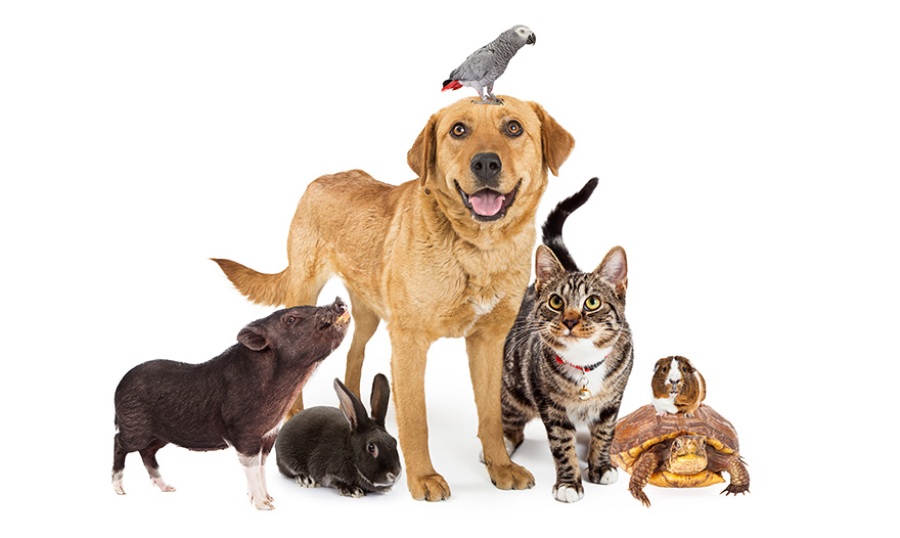
The UK Pet Industry
Today, Britain is more in love with their pets than ever before. An estimated 12 million of UK households have a pet, that’s 44% of the British population, and this figure has increased by 4% since last year. This country may have experienced some spending cuts in the past decade, but our spending on pets and pet-related products shows no sign of slowing down.
“The pet industry seems to defy all the odds during recessions and has been very little affected by economic crisis so far. What makes the pet industry so immune to uncertainty and insecurity? I guess one answer is: Do we really have the heart to cut back on the well-being of our beloved pets? Probably not.” Costas Constantinou, Franchise Manager of Husse.
Expenditure on pet care this year (2018) rose to a record breaking £4.7 billion, as Statista's graph below demonstrates. This is a massive increase compared to 2005, where only £2.55 billion British pounds were spent. These figures don’t just represent the basic expenses incurred by owning pets – they show that our furry friends are taking prime position in the UK household and being thoroughly pampered! Brits are now spending a whopping £1 billion per year on ‘treats’ for their pets alone.
"Pet businesses are not necessarily subject to the same market forces as other industries. For example, some product and services have the potential to reduce in demand when there is a recession or market uncertainty. However, the UK pet industry has continued to boom as devoted animal lovers continue to spend and will often cut back on their own luxuries before they deny their best friends the products and services we provide." Richard Dancy, Marketing Consultant of Barking Mad.

Key Trends
The Humanisation of Pets: Pet owners increasingly identify their pets as members of the family, and are prepared to spend big money on them. The demographic shifts contributing to this trend vary, but could include the rise of single-occupancy households, double income couples, widowed seniors and high divorce rates. In many cases, the pet becomes the focus of the household and is a crucial source of company and affection. Our pets provide joy to so many, so it’s no wonder that we’re prepared to make a fuss of them!
Premium Products: The health and longevity of our beloved pets is paramount. More and more, consumers are focusing on the diets of their pets and the ingredients found in pet food. Human grade meat and all-natural or organic ingredients are in demand, which has led to an opening for niche, high-quality products at reasonable prices.
Pet Care: Working pet owners often require care options for their pets. The need for boarding kennels, animal minders and walkers has created a whole industry based around pets’ wellbeing and safety. Pet day care and crèches are becoming a common expense, since these businesses offer our pets company, exercise and activities.
Pet Pampering: Pet grooming businesses, in particular dog grooming, are growing in popularity. Not only do busy pet owners want their pets to look well, a trained groomer can save them a lot of time and effort – particularly if, as often happens, their pet is not a fan of being groomed!
“Something else that gives the pet industry that extra strength is predictability. The industry maintains a steady healthy level of demand throughout the year, peaking slightly in December. Predictability allows stock levels to be managed more easily. During the last decade, humans have become a lot more health conscious, and that trend has now transferred over to their pets – causing a rapid rise in the sale of healthy natural premium pet food!” Costas Constantinou, Franchise Manager of Husse.

Dogs are the most popular pet with Brits this year- a massive 26 per cent of us have one! With such a high ownership of pets in the UK today, the possibilities are endless for franchisees in such a growing and dynamic market.
Factors to Consider when Starting a Pet Business
- Passion: While opportunities within the pet industry are diverse, and some may not involve much direct contact with animals, it’s still essential to like animals. Owners take their pets extremely seriously and you’ll need to be able to impart a similar enthusiasm to clients.
- Facilities: It’s important to consider the type of business you wish to run and the facilities needed to run it. Day care facilities or boarding kennels may require substantial premises, while a grooming parlour would involve a lot of kit. Ensure you have a realistic overview of all the potential expenses necessary beyond the franchise fee. Assess your own financial situation and check out the financing options available to ensure that you won’t end up unexpectedly out of pocket.
- Your Territory: The franchise may grant you an exclusive territory in which to operate under their brand, but you still need to consider your location and investigate other local pet businesses. Is there a market for what you’re offering? Do your research, estimate the local pet population, and try to tap into a needed service.
- The Brand: How established is the franchise you wish to join? Does it have a good reputation? If it’s a lesser-known brand, it should at least have a range of franchise benefits and training to make an investment worth your while. It’s also a good idea to research the brand’s marketing plan and materials, as substandard marketing will prove detrimental to your business.
- Research, Research, Research: Speak to current franchisees of the brand and hear about their experiences. Attend a discovery day, if possible. Visit the franchise’s head office and read the franchise agreement thoroughly. In other words, don’t get swept away or invest before gaining a comprehensive knowledge of the brand, particularly in terms of its contributions and expectations. Ultimately, you will be representing this brand so you need to like them!

- How much capital is required? Does the company offer financial support? Some companies offer finance packages. It is also worth contacting your local bank manager as they may offer you a more attractive interest rate on lending.
- What kind of training and support will they provide? Most franchises provide investors with training in the various products and services – however it is worth researching the extent of the training involved and whether or not ongoing training and support is provided after this.
- Are there many similar pet businesses in your area? You must make sure that there is a proven market for the product or service you will be providing, and that there are not too many other businesses offering the same or similar products or services. Some franchisors offer territorial exclusivity, which means that you would have the exclusive rights to that particular franchise within a certain area, which is attractive but does not completely rule out the possibility of other similar companies operating nearby.
- How strictly do you need to conform to guidelines set out by the franchisor? For instance, if you are setting up a pet grooming business – do you need to buy all the grooming equipment such as pet showers or can you use your own facilities? This equipment can often be quite expensive and it is worth researching this before making any hasty decisions. Also, some franchisors ask their franchisees to locate their businesses in retail areas, so if you are planning on working from home this might not be an option for you.
- What are the company’s policies on selling your franchise down the road? In future, you may decide to sell on your business for a variety of reasons. Before investing your money, you should consult with the franchise company to make sure that their resale policy will suit your plans for the future.
- Is the business model going to provide you with long term revenues? Make sure that the product or service is marketable and coherently packaged. Having passion for the product you are selling is important but, if it is not well packaged or marketed the customer may fail to see how valuable your product/service is. Ask to look at the company’s marketing literature and information pamphlets before making any decisions. Also speak to existing franchisees about their experience within the franchise. The franchise agreement is also another very important document to read through carefully. It should clearly outline all the terms and conditions of your relationship with the franchise.

Relevant Requirements
Wherever it applies, it’s important to ensure a brand legitimately complies with all necessary animal welfare and manufacturing legislation before signing up. Any dealings with animals should comply with the 2006 Animal Welfare Act – contact the RSPCA for more information on this if needed.
Residential: Animal boarding businesses are subject to the 1963 Animal Boarding Establishments Act. This means that you’ll need to obtain a licence from the local council in order to operate. The licence is granted at the discretion of the local council and they will consider the suitability of the accommodation and whether the animals are adequately cared for and protected. Planning issues should also be considered if your business requires making adjustments to your home. Any structural changes will mean contacting your local authority for permission.
A 2014 amendment to the Dangerous Dogs Act states that individuals in charge of a dog may be liable if the dog becomes ‘dangerously out of control’. It is worth considering the animals you take on, and rejecting those that may have a tendency towards aggression or bad behaviour.
Pet Food: According to the Pet Food Manufacturers’ Association, the manufacture of pet food is subject to more than 50 pieces of legislation. All foods for animals are governed by the same legislation and the laws are stringent. Additionally, as pet food is manufactured and distributed in the same way as human food, some legislation governing human food is equally applicable to pet food.
Insurance: Your business will need to be adequately covered from the very beginning. Cover will depend on whether you run the business from home or not, and the type of service that you are offering. Pet business insurance should cover public liability and liability for the pets you are caring for, along with property damage. Some house insurance policies may also cover home-based businesses.

Trust: If you are working directly with their animals, you need to ensure that you can build a trusting relationship with clients. The clients need to know that you are capable of caring for their beloved pet, so do everything you can to make them feel more comfortable. First aid training and animal behaviour courses will certainly make your client feel at ease, and help you in caring for pets to the best of your ability.
A good franchise package should provide guidance on animal care training for franchisees. Franchises such as Barking Mad, Playful Pups, MyWaggyTails and Scamps and Champs. include training in their franchise fee.
Vehicles: If your role includes the transportation of animals, you will need adequate harnesses and cages, along with insurance which covers special usage.
“A pet franchise owner needs all the qualities of any successful franchise business owner in that they need to work hard and follow the system. However, they also need to understand pet people and what a dog lover feels like when discussing their beloved member of the family. Our franchisees tend to have had a career previous to Barking Mad either in a profession or in middle to senior management and therefore bring with them a level of experience in self-organisation, motivation and professionalism.” Richard Dancy, Marketing Consultant of Barking Mad.
Pet franchising offers a diverse range of business models for a rewarding and recession-proof career. Is pet franchising the ideal route into business for you? Get started by browsing our pet franchise opportunities today.














